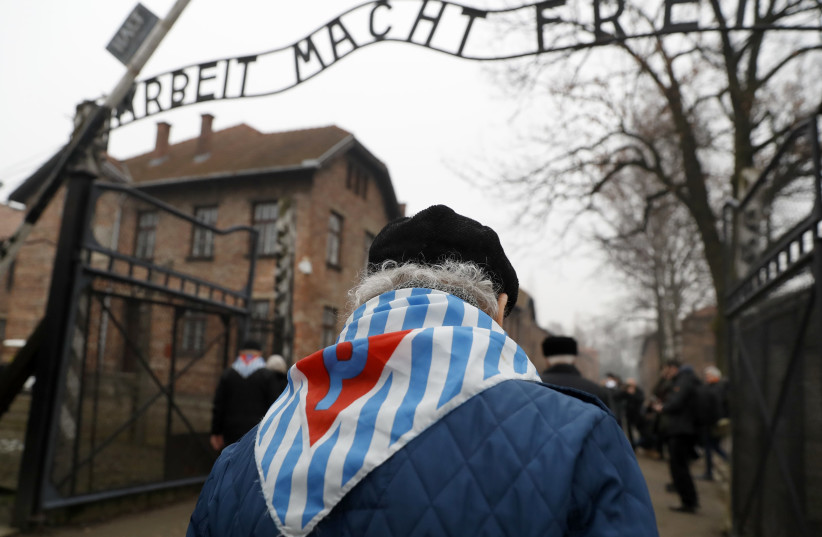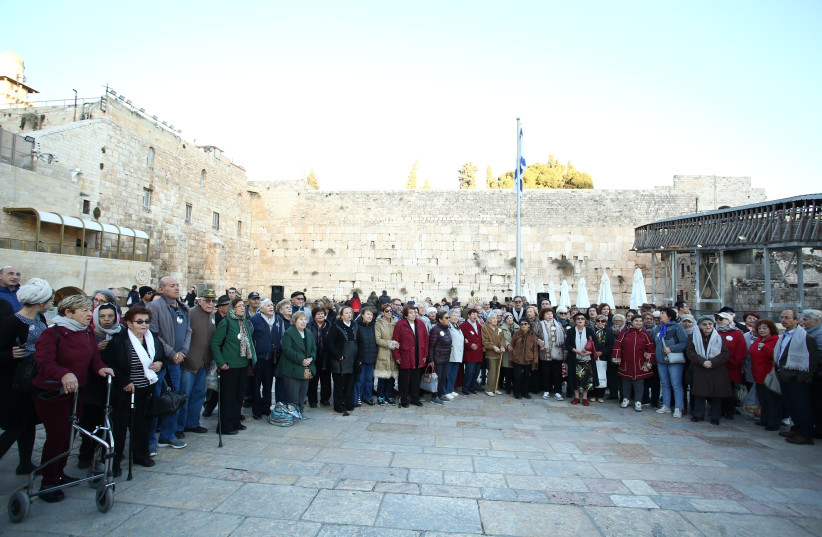 Holocaust survivors in the US still struggling to survive
Holocaust survivors in the US still struggling to survive
HALEY COHEN
Survivors like Steigmann are having trouble affording necessities. So he reached out to Jewish organizations for help.
.

(photo credit: KACPER PEMPEL / REUTERS)
NEW YORK – More than 75 years after the Holocaust ended, survivors living in the United States continue to suffer.
New York City is home to the largest community of Holocaust survivors and their descendants out of any city outside of Israel. As the world commemorates International Holocaust Remembrance Day on January 27, the day Auschwitz-Birkenau was liberated in 1945, 40% of the 36,000 survivors in the New York area live in or near poverty. Compared to the 10% of Americans 65 and older who live in poverty, as reported by the US Department of Health and Human Services, Holocaust survivors are a much greater risk group.
“I am part of the one-third of US Holocaust survivors in poverty,” Sami Steigmann, who resides in Manhattan, said. “When I speak about the challenges I faced in the Holocaust, I also speak about another challenge I’ve overcome: homelessness.”
Steigmann, 82, was born in Romania. In 1941, he was taken with his parents to a labor camp called Mogilev-Podolsky. Being too young to work, Steigmann was subjected to Nazi medical experimentation in his early years. Although he doesn’t remember that period of time, he said he still feels the side effects every day.
“There are many New York organizations set up to help survivors, but for the most part they only provide a one-time allotment,” Steigmann, who today lives alone in a tiny studio apartment and has no surviving relatives, continued.
He added that most of the foundations are unaware he is even in need.
“I don’t complain. I don’t like to talk about how much pain I’m in, not even to my closest friends. I come from a generation that was very stoic.”

Steigmann, a motivational speaker who started his own foundation called Sami Speaks, added that he has become friends with other New York-based survivors through becoming a member of the second-largest Holocaust museum in the US, the Museum of Jewish Heritage in downtown Manhattan.
The museum offers a variety of programs to help survivors preserve their stories, including The Speakers Bureau, which is comprised of Holocaust survivors, World War II veterans and descendants of survivors who present their or their family’s experiences during the Holocaust to groups of 20 or more people.
Due to COVID-19, the museum is offering testimony from members of the Speakers Bureau on Zoom. Additionally, the monthly Stories Survive features Holocaust survivors outside of the Speakers Bureau sharing testimonies that are recorded and added to their Survivor Testimony channel on YouTube.
The Jewish Federations of North America’s Center on Holocaust Survivor Care and Institute on Aging and Trauma announced they will award 55 grants totaling $5,325,000 to organizations across the US. This represents the largest number of grants and the largest dollar amount in the program’s history. Grantees will deliver social services to thousands of Holocaust survivors, diverse older adults with a history of trauma and their family caregivers.
“The pandemic has shown what a difference we can make when we come together, especially for those older adults at the highest risk of COVID-19,” said Mark Wilf, chair of the JFNA Board of Trustees. “Holocaust survivors are our teachers and our heroes, and we are committed to empowering them to live with comfort in their communities. The Federation system is humbled and proud to help thousands of Holocaust survivors, as well as other older trauma survivors and their families during their time of need.”
This year’s grantees include Network of Jewish Human Service Agencies (NJHSA), which uses Uniper technology to prevent social isolation among older adults in more than a dozen communities; Bet Tzedek, which provides access to legal services for Holocaust survivors across multiple cities; and Habitat for Humanity International, a new subgrant for 2022, which will provide training for how to do home modifications in a person-centered, trauma-informed way in three cities.
In addition to funds for direct services, Jewish Federations said they will provide intensive education and training to all grantees, working closely with NJHSA and other local and national service providers to implement the grant program.
More than 60 experts in aging and trauma volunteer their talents to help JFNA implement the program, train grantees and build capacity to employ the person-centered, trauma-informed (“PCTI”) approach.
JFNA noted that its efforts are with strong bipartisan Congressional support backed by Sens. Ben Cardin (D-MD) and Kevin Cramer (R-ND), and Reps. Debbie Wasserman Schultz (D-FL) and Anthony Gonzalez (R-OH).
Still, survivors like Steigmann are having trouble affording necessities. When he couldn’t afford a hearing aid, Steigmann reached out to Jewish organizations for help. He pointed out The Blue Card as being particularly beneficial, a nonprofit that provides financial assistance to survivors of the genocide that killed six million Jews in Europe.
“These are people who have suffered so much, they’re proud people and it’s not always easy for them to step up on their own and admit that they can’t pay rent or medical bills,” Masha Pearl, executive director of The Blue Card, said. “Our goal is to help survivors preserve their dignity and stay safely and independently in their homes for as long as possible to avoid institutionalization, which is a big fear they have.”
The organization, which works through local social service agencies that refer survivors to them for financial assistance, is based in New York but assists survivors in 38 states across the US.
“Life expectancy is longer these days and the survivors we’re seeing in New York are all in their 70s, 80s, 90s and beyond,” Pearl continued. “I just spoke with a 105-year-old survivor in Brooklyn still living at home and very active and thriving. The survivors we’re seeing are living on basic pensions from the government and reparations from Germany due to the suffering they endured, really just barely making ends meet.
“Sometimes they have to decide between dentures or a hearing aid, they can’t afford both. We hear very sad stories of survivors rationing their medicine, taking half a dose instead of a full dose, making food last longer than it should or choosing not to leave the heat on in these very cold days.”
Pearl noted the foundation has seen an uptick in need since the start of the pandemic.
“Particularly we’ve seen more requests for appliance replacements since people are home more,” she said. “It’s a very challenging time and the lack of socialization has played a huge role, so we started sending battery-operated pets that with a press of a button wag their tails and bark like a real dog, providing survivors with a sense of companionship.”
She expressed the belief that more assistance to survivors should be offered by the state of New York. “The organizations like us have stepped up tremendously to meet the gaps.”
The Blue Card also assists in helping survivors share and preserve their stories.
“We get requests from synagogues and both public and private schools for survivors to speak,” Pearl said. “We make an effort to match them up with those opportunities, utilizing reporting, Zoom and conference calls for survivors to tell their stories, because the opportunity and window are slowing closely. This is really one of our last opportunities for younger generations to hear survivor stories firsthand.”
Zawartość publikowanych artykułów i materiałów nie reprezentuje poglądów ani opinii Reunion’68,
ani też webmastera Blogu Reunion’68, chyba ze jest to wyraźnie zaznaczone.
Twoje uwagi, linki, własne artykuły lub wiadomości prześlij na adres:
webmaster@reunion68.com
